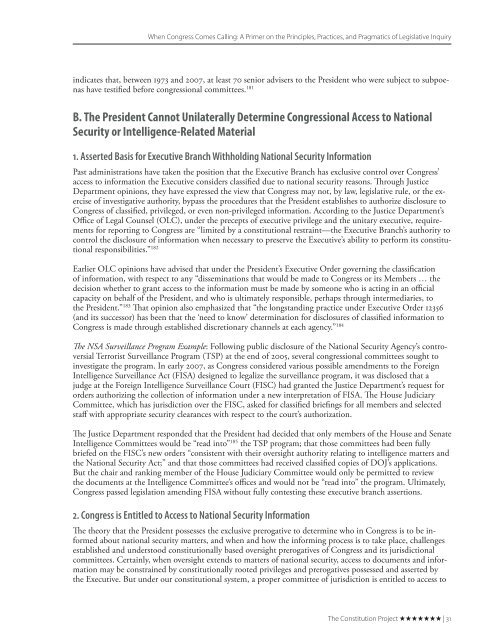When Congress Comes Calling
WhenCongressComesCalling
WhenCongressComesCalling
You also want an ePaper? Increase the reach of your titles
YUMPU automatically turns print PDFs into web optimized ePapers that Google loves.
<strong>When</strong> <strong>Congress</strong> <strong>Comes</strong> <strong>Calling</strong>: A Primer on the Principles, Practices, and Pragmatics of Legislative Inquiry<br />
indicates that, between 1973 and 2007, at least 70 senior advisers to the President who were subject to subpoenas<br />
have testified before congressional committees. 181<br />
B. The President Cannot Unilaterally Determine <strong>Congress</strong>ional Access to National<br />
Security or Intelligence-Related Material<br />
1. Asserted Basis for Executive Branch Withholding National Security Information<br />
Past administrations have taken the position that the Executive Branch has exclusive control over <strong>Congress</strong>’<br />
access to information the Executive considers classified due to national security reasons. Through Justice<br />
Department opinions, they have expressed the view that <strong>Congress</strong> may not, by law, legislative rule, or the exercise<br />
of investigative authority, bypass the procedures that the President establishes to authorize disclosure to<br />
<strong>Congress</strong> of classified, privileged, or even non-privileged information. According to the Justice Department’s<br />
Office of Legal Counsel (OLC), under the precepts of executive privilege and the unitary executive, requirements<br />
for reporting to <strong>Congress</strong> are “limited by a constitutional restraint—the Executive Branch’s authority to<br />
control the disclosure of information when necessary to preserve the Executive’s ability to perform its constitutional<br />
responsibilities.” 182<br />
Earlier OLC opinions have advised that under the President’s Executive Order governing the classification<br />
of information, with respect to any “disseminations that would be made to <strong>Congress</strong> or its Members … the<br />
decision whether to grant access to the information must be made by someone who is acting in an official<br />
capacity on behalf of the President, and who is ultimately responsible, perhaps through intermediaries, to<br />
the President.” 183 That opinion also emphasized that “the longstanding practice under Executive Order 12356<br />
(and its successor) has been that the ‘need to know’ determination for disclosures of classified information to<br />
<strong>Congress</strong> is made through established discretionary channels at each agency.” 184<br />
The NSA Surveillance Program Example: Following public disclosure of the National Security Agency’s controversial<br />
Terrorist Surveillance Program (TSP) at the end of 2005, several congressional committees sought to<br />
investigate the program. In early 2007, as <strong>Congress</strong> considered various possible amendments to the Foreign<br />
Intelligence Surveillance Act (FISA) designed to legalize the surveillance program, it was disclosed that a<br />
judge at the Foreign Intelligence Surveillance Court (FISC) had granted the Justice Department’s request for<br />
orders authorizing the collection of information under a new interpretation of FISA. The House Judiciary<br />
Committee, which has jurisdiction over the FISC, asked for classified briefings for all members and selected<br />
staff with appropriate security clearances with respect to the court’s authorization.<br />
The Justice Department responded that the President had decided that only members of the House and Senate<br />
Intelligence Committees would be “read into” 185 the TSP program; that those committees had been fully<br />
briefed on the FISC’s new orders “consistent with their oversight authority relating to intelligence matters and<br />
the National Security Act;” and that those committees had received classified copies of DOJ’s applications.<br />
But the chair and ranking member of the House Judiciary Committee would only be permitted to review<br />
the documents at the Intelligence Committee’s offices and would not be “read into” the program. Ultimately,<br />
<strong>Congress</strong> passed legislation amending FISA without fully contesting these executive branch assertions.<br />
2. <strong>Congress</strong> is Entitled to Access to National Security Information<br />
The theory that the President possesses the exclusive prerogative to determine who in <strong>Congress</strong> is to be informed<br />
about national security matters, and when and how the informing process is to take place, challenges<br />
established and understood constitutionally based oversight prerogatives of <strong>Congress</strong> and its jurisdictional<br />
committees. Certainly, when oversight extends to matters of national security, access to documents and information<br />
may be constrained by constitutionally rooted privileges and prerogatives possessed and asserted by<br />
the Executive. But under our constitutional system, a proper committee of jurisdiction is entitled to access to<br />
The Constitution Project | 31


